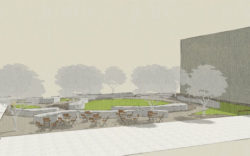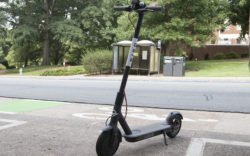Jobs that pay decent wages are “the missing part” contributing to Athens-Clarke County’s high poverty rate, says Linda Lloyd of the Economic Justice Coalition, a local group that has (with some success) pressed the University of Georgia to raise wages for its lowest-paid workers. Some 1,800 UGA part-timers earn $10 per hour or less (some as low as minimum wage), according to a UGA spokesman—and that doesn’t include student workers. Lloyd told the ACC Federation of Neighborhoods last week that UGA’s low wages just give other local businesses an excuse to pay employees less: “They feel they can do that, because UGA is paying nothing,” she said.
“We want Walmart to pay a living wage,” she said. “We’re only really going to support [businesses] who pay $11 an hour” or more. “It’s not about lazy people,” she said. With minimum-wage jobs, “it doesn’t matter how hard you work, the system is against you… You can’t do anything with $7.25 an hour. All it does is keep you poor, really.”
She encouraged people to volunteer to engage with local families where children need role models for future careers: “If I’m going to be a teacher, I need to be hanging around another teacher. If I’m going to be a doctor, it’s the same.” But sometimes, Lloyd said, she must first make sure clients have enough to eat. And, she supports the Occupy movement. “We know Occupy is telling the truth,” she said. “The people at the bottom are scraping.”
Athens narrowly missed a large federal grant for the education-based initiative Whatever It Takes, a “pipeline of support” to local families by some 50 allied organizations. In Harlem, the program after which WIT was modeled dramatically increased the numbers of young people who graduated from college; similar programs have been a priority of President Obama, but Congress has reduced funding.
In Athens, such local partnerships have already cut ACC’s teen pregnancy rate by close to 90 percent, said Tim Johnson of Family Connection/ Communities in Schools. “We’re all products of our environment,” and children with problems—health problems, school problems, early pregnancies, abuse—are often from high-poverty neighborhoods. Changing that requires not just dealing with individual children, but with families and neighborhoods, Johnson said.
Despite its limited funding, Whatever It Takes has mobilized grassroots leaders through successful focus groups aimed at implementing solutions including medical support, mentors and tutors, tours of UGA, providing books and Internet access and promoting community involvement—all to engage and advance children’s educations. “The leadership is really coming from the neighborhoods,” he said.
Like what you just read? Support Flagpole by making a donation today. Every dollar you give helps fund our ongoing mission to provide Athens with quality, independent journalism.









